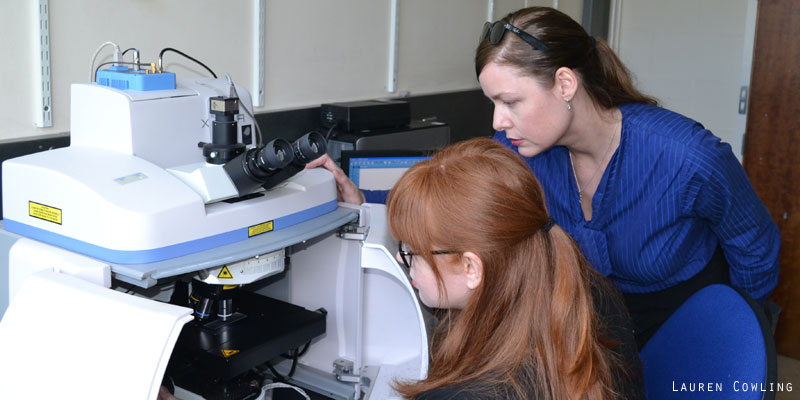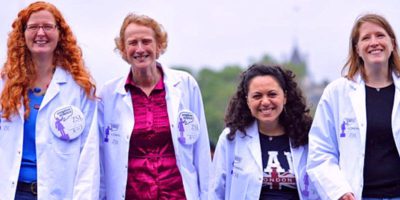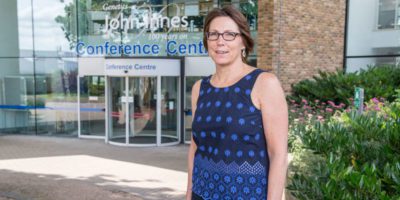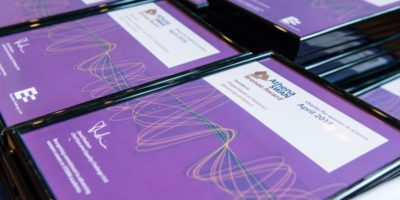Dr. Yvette Hancock is a lecturer in the Department of Physics at the University of York. She is communications chair for her department and a graduate admissions tutor. Her specialist areas of expertise include quantum physics, nanotechnology and Raman spectroscopy applied to biomedicine and archaeology.
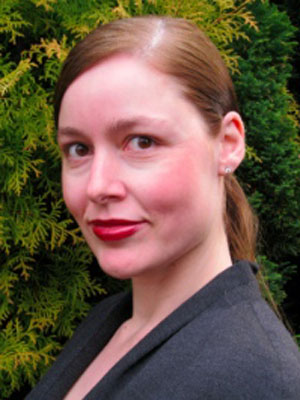
“…My personal thoughts are that our greatest goals can only be achieved by inclusivity, as each individual has the potential to make a unique and positive contribution to our collective advancement. Only diversity can make this happen – hence its paramount importance and my personal passion for it…”
My career to date
I obtained my Ph.D. [Doctor of Philosophy] in 2003 at Monash University in Melbourne, Australia, with specialisation in theoretical quantum physics and engineering of nanoscale technologies. While at Aalto University in Helsinki from 2006-2009, I was the research manager of a large-scale collaboration with the Nokia Corporation, where one of the projects that I supervised was the application of graphene in next-generation mobile technologies.
Since 2009, I have been lecturer in the Department of Physics at the University of York where I work with my research group on the theoretical design of graphene. My research is now also very interdisciplinary and has expanded into Raman spectroscopy applied to cancer research, regenerative medicine, infectious disease and bio-archaeology.
Physics – always challenging and not easy
I always found physics to be very challenging and not an easy subject, and I was fascinated in it because it was challenging. I did not know that I could have a career in physics until university. Up until my second undergraduate year of a combined science and engineering degree at Monash, I thought I was going to become an engineer. However, I found myself asking a lot of questions during the engineering lectures, especially ‘why’ questions and being concerned about things not being precise.
Encouraged to always ask ‘why?’
I had a wonderful female lecturer who came up to me after one of her engineering lectures and told me in a kind way that I asked too many questions to make a good engineer. She then advised me to seek a career in science. I soon discovered that the best science to answer my questions was physics where it was absolutely encouraged to always ask ‘why?’.
My passion for physics therefore comes from the possibility of finding out about nature in every possible detail, although I think I have not completely forgotten about engineering as I enjoy applying this understanding to help humanity. This can be seen in my research as I use my physics understanding to design new technologies, and, more recently, to help diagnose and treat disease, as well as unravel archaeological secrets.
Why diversity is so important
The University of York values diversity and supports this by ensuring dignity, fairness and respect for all its staff and students. The university also promotes these qualities to the greater community through outreach and in supporting community diversity.
A wonderful example of this was the recent raising of the rainbow flag on the University of York campus by our vice-chancellor Professor Koen Lamberts and the university’s support for the 2015 York Pride event. The university has strong equality and diversity policies for workplace and teaching practices, an equality and diversity office and university committee, which advises, ensures training and provides support on these matters at all levels.
Our greatest goals can only be achieved by inclusivity
The university promotes a warm and welcoming environment, which actively pursues equality and embraces diversity. My personal thoughts are that our greatest goals can only be achieved by inclusivity, as each individual has the potential to make a unique and positive contribution to our collective advancement. Only diversity can make this happen – hence its paramount importance and my personal passion for it.
The Athena SWAN charter – providing focus to the serious issues surrounding the underrepresentation of women in STEMM
The Athena SWAN charter provides focus to the serious issues surrounding the underrepresentation of women in STEMM areas (science, technology, mathematics and medicine).
This year, the Athena SWAN charter will be expanded to include the arts, humanities and social sciences. The charter outlines key areas to address including the high loss rate of women from senior positions, the absence of diversity in management, a call for action for gender equality and the equal representation of women at all levels.
As well as providing such guidance, achieving an Athena SWAN award provides important external recognition of the department and university progress towards achieving the Charter’s aims.
Continuous improvement continues, even after a Gold award
The Athena SWAN charter requires continuous development, meaning that even if Athena SWAN Gold is achieved, the university or department will still need to subsequently demonstrate advancement and achievement with respect to the charter to maintain this external level of recognition.
As a woman, I feel especially encouraged by Athena SWAN and to know that through its charter I can be afforded every possible opportunity to reach my highest level of achievement and professional development.
Physics going for gold
The Department of Physics is now actively working towards the Athena Swan Gold award, which is being coordinated by the department’s Equality Committee. As an inclusive process, all department members, both staff and students, are contributing to this next level of achievement.
The department has already made great strides in overseeing equality and diversity issues related to work practices and teaching. Some examples include ensuring appropriate representation of women on decision-making panels, establishing a flexible and family-friendly work environment, having transparency in promotions policy, fostering mentorship for career development and implementing gender awareness training.
Delving deeper
Physics is dedicated to developing to the highest levels of excellence and ensuring sustainable changes to the work and teaching environments that embraces and supports equality and diversity.
To do this, we are delving deeper by collecting and analysing statistics related to gender and diversity from surveys, staff and student demographics, etc. and tracking these as the department implements changes and expands in size.
These studies will ensure a deeper understanding of the underlying issues (such as unconscious bias) ensuring more profound, effective and lasting positive change. Open discussion with the university’s gender and equality and Athena SWAN committees also provides opportunity for sharing good practice with other departments.
Getting students involved
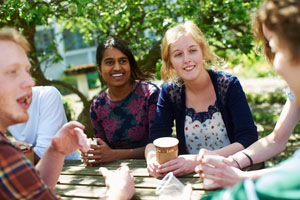
The department also provides training in equality and diversity for postgraduates who teach. Outreach opportunities are abundant for our students (both at postgraduate and undergraduate levels) providing opportunity for them to act as role models through outreach events.
Some of these events occur in collaboration with external groups interested in promoting gender and diversity. The department’s IOP [Institute of Physics] funded ‘Girls in Physics’ event for A-level high-school students, and our collaboration with Science Grrl’s Ada Lovelace Day are two out of many wonderful events to highlight.
Communicating gender and diversity awareness to current and prospective students
As graduate admissions tutor, I believe that communicating gender and diversity awareness is of paramount importance, not only to prospective students, but also to current postgraduate students and staff. To assist with this, we regularly profile the stories and achievements of our women postgraduates and alumni on our department webpages and publications as a means of celebrating diversity and demonstrating our serious commitment to supporting the career development of women in physics.
In my role as graduate admissions tutor, I have also implemented the tracking of gender-related statistics pertaining to postgraduate admissions, the result of which are then made available to raise consciousness and to create sensitivity towards gender and diversity balances in the research groups. It is important to me, in my role, to do everything I can to facilitate positive change and awareness.
Getting staff involved
The department’s Equality Committee liaises with other department committees, such as the Management team, Board of Studies, Research Committee, Staff–Student Liaison Committee, etc., and the department in general via our staff forum and weekly staff digest. The committee acts by raising the awareness of gender and diversity issues in these various forums, and actively seeks input from all members of the department via open formal and informal discussion.
Banishing perceptions of tokenism
I think anyone can be at risk of perceiving diversity as ‘tokenism’. Diversity also encompasses more than just gender and may be related to an individual’s unique set of experiences and history, with biases, more often than not, being unconscious.
Ways to counter perceived ‘tokenism’ involve open discussion and training to invoke consciousness raising, and by presenting indisputable evidence in the form of local and global statistics on diversity issues, such as the leaky pipe syndrome.
Ellie the Electron – inspiring girls to leap from the nanoworld to the quantum world
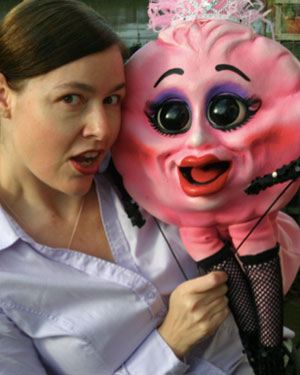
In addition to my research interests, I am passionate about physics outreach and enjoy finding innovative and fun ways of teaching complex physics concepts. ‘Ellie the Electron’ is a children’s book that I have written, which teaches quantum physics concepts through imaginative story telling for children as young as five years old (although it is really for people of all ages!)
In the story, Ellie wants to escape the quantum circus of the nanoworld and asks the famous quantum magician, Mr Einstein for his help. Ellie is a girl because I wanted to inspire young girls in physics, but also I wanted to excite children about physics from a very early age when they are still asking questions such as, “Why is the sky blue?” and have vast imaginations to make the leap into the quantum world.
I have also translated ‘Ellie’ into a pantomime and have collaborated with Darryl Worbey, who has worked with The Muppets, to create a puppet that I use in performance. This year, I was extremely fortunate to find the ‘Ellie’ book a publisher (Ockham Press) and I am now finishing off the paintings for the illustrations. I am really excited for ‘Ellie’ to be published and my sincerest wish is that she will inspire a curiosity and love of physics in everyone who knows her story.
https://www.york.ac.uk/physics/people/hancock/
https://twitter.com/EllieElectron

